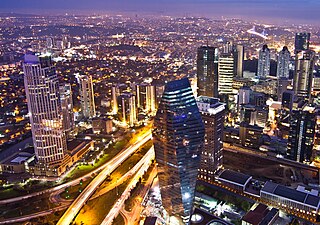
The Turkish construction and contracting industry represents one of the key sectors of Turkey's economy.

The Turkish construction and contracting industry represents one of the key sectors of Turkey's economy.
This section needs to be updated.(April 2021) |
During the periods in which investments slowed down in the public and private sectors, foreign contracting services gained importance. The shrinking of the economy in Turkey and the bottleneck in the construction sector resulting from it, has forced construction companies to concentrate more on business abroad.[ citation needed ]
The opening of the Turkish contractors to foreign markets started at the beginning of the 1970s. The first country to which Turkish contractors exported their services was Libya, where they started their projects by importing the necessary technology from European countries. [1]
Later on, the growing Turkish contracting services expanded to other foreign markets such as Iraq, Jordan, Saudi Arabia, Kuwait, the United Arab Emirates, Yemen and Iran. Particularly during the 1970s, 90% of the expatriate works undertaken were realized in Arab countries.[ citation needed ] Since the beginning of the 1980s, the Turkish Contractors have oriented themselves more towards the former Soviet Union countries.[ citation needed ] In the 1990s, due to the economic depression and the political uncertainties in the Middle Eastern and North African countries, the Turkish Contractors have focused predominantly on the Commonwealth of Independent States, Eastern Europe and Asian countries. In this framework, they have undertaken important projects in the Russian Federation, Ukraine, the Caucasus, the Central Asian Republics, Germany, Pakistan and the Far East. [1]
From the beginning of the 1970s to the end of 2022, Turkish contractors have completed more than 11,605 projects in 133 countries. [2] Their business volume abroad has reached 472 billion US Dollars in 2022. [2] The Turkish Contractors Association (TCA) currently[ when? ] has 139 members from Turkeys main contracting companies. [1] 90% of the members of TCA is composed of engineers and architects. These are responsible for the realisation of 70% of domestic construction works and 80% of over 4,200 projects undertaken in 69 countries. [1]
Some contractors and construction companies in Turkey have been accused of corruption for their lack of compliance with the latest safety regulations and laws, causing many deaths in earthquakes. [3]
To improve the energy efficiency of buildings it has been suggested that green building principles and technologies should be applied. [4]
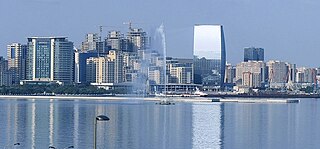
The economy of Azerbaijan is highly dependent on oil and gas exports, in particular since the completion of the Baku-Tbilisi-Ceyhan Pipeline. The transition to oil production in the late 1990s led to rapid economic growth over the period 1995–2014. Since 2014, GDP growth has slowed down substantially.
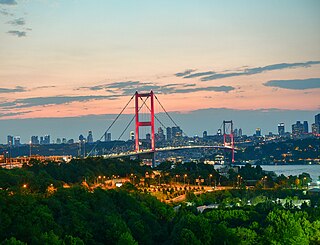
Turkey is a founding member of the OECD and G20. The country's economy ranked as the 18th-largest in the world and 8th-largest in Europe by nominal GDP in 2023. It also ranked as the 11th-largest in the world and 5th-largest in Europe by PPP in 2023. As of 2024, Turkey is a developing, upper-middle income, mixed economy. Turkey has often been defined as a newly industrialized country since the turn of the 21st century. The country is the fifth most visited destination in the world, and has over 1,500 R&D centres established both by multinational and national firms. Turkey is among the world's leading producers of agricultural products, textiles, motor vehicles, transportation equipment, construction materials, consumer electronics, and home appliances. Among OECD nations, Turkey has a highly efficient and strong social security system; social expenditure stood at roughly 12.5% of GDP.
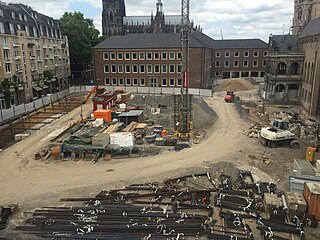
Construction is a general term meaning the art and science of forming objects, systems, or organizations. It comes from the Latin word constructio and Old French construction. To 'construct' is a verb: the act of building, and the noun is construction: how something is built or the nature of its structure.
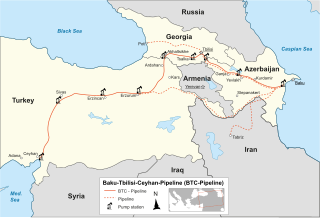
The Baku–Tbilisi–Ceyhan (BTC) pipeline is a 1,768 kilometres (1,099 mi) long crude oil pipeline from the Azeri–Chirag–Gunashli oil field in the Caspian Sea to the Mediterranean Sea. It connects Baku, the capital of Azerbaijan and Ceyhan, a port on the south-eastern Mediterranean coast of Turkey, via Tbilisi, the capital of Georgia. It is the second-longest oil pipeline in the former Soviet Union, after the Druzhba pipeline. The first oil that was pumped from the Baku end of the pipeline reached Ceyhan on 28 May 2006.
Build–operate–transfer (BOT) or build–own–operate–transfer (BOOT) is a form of project delivery method, usually for large-scale infrastructure projects, wherein a private entity receives a concession from the public sector to finance, design, construct, own, and operate a facility stated in the concession contract. The private entity will have the right to operate it for a set period of time. This enables the project proponent to recover its investment and operating and maintenance expenses in the project.
Blue Stream is a major trans-Black Sea gas pipeline that carries natural gas to Turkey from Russia. The pipeline has been constructed by the Blue Stream Pipeline B.V., the Netherlands based joint venture of Russian Gazprom and Italian Eni. The Blue Stream Pipeline B.V. is an owner of the subsea section of pipeline, including Beregovaya compressor station, while Gazprom owns and operates the Russian land section of the pipeline and the Turkish land section is owned and operated by the Turkish energy company BOTAŞ. According to Gazprom the pipeline was built with the intent of diversifying Russian gas delivery routes to Turkey and avoiding third countries.
The economic history of the Republic of Turkey had four eras or periods. The first era had the development policy emphasizing private accumulation between 1923 and 1929. The second era had the development policy emphasized state accumulation in a period of global crises between 1929 and 1945. The third era was state-guided industrialization based on import-substituting protectionism between 1950 and 1980. The final, era was the opening of the economy to liberal trade in goods, services and financial market transactions since 1981.

The economy of the Middle East is very diverse, with national economies ranging from hydrocarbon-exporting rentiers to centralized socialist economies and free-market economies. The region is best known for oil production and export, which significantly impacts the entire region through the wealth it generates and through labor utilization. In recent years, many of the countries in the region have undertaken efforts to diversify their economies.

Shah Deniz gas field is the largest natural gas field in Azerbaijan. It is situated in the South Caspian Sea, off the coast of Azerbaijan, approximately 70 kilometres (43 mi) southeast of Baku, at a depth of 600 metres (2,000 ft). The field covers approximately 860 square kilometres (330 sq mi). Stretching out over 140 square kilometres, the reservoir is similar in size and shape to Manhattan Island.

The Ünye–Ceyhan pipeline, commonly known with its former name, the Samsun–Ceyhan pipeline, was a planned crude oil pipeline traversing Turkey from the Black Sea to the Mediterranean oil terminal in Ceyhan. The aim of the project was to provide an alternative route for Russian and Kazakhstani oil and to ease the traffic burden in the Bosporus and the Dardanelles. The project was halted in 2010. This was confirmed again in 2013.

Consolidated Contractors Company (CCC) is the largest construction company in the Middle East and ranks among the top 25 international contractors with a revenue of US$5.3 billion in 2013 and 1.872 billion by 2020. CCC has offices and projects in over 40 countries, and in 2023 had a workforce of 36,000 employees. In April 2019, CCC was engaged in 40 ongoing projects globally. The majority of its sales are in the Middle East.

The South Caucasus Pipeline is a natural gas pipeline from the Shah Deniz gas field in the Azerbaijan sector of the Caspian Sea to Turkey. It runs parallel to the Baku–Tbilisi–Ceyhan pipeline (oil).
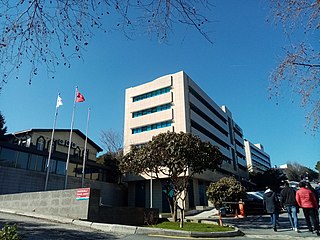
Enka İnşaat ve Sanayi A.Ş. is a Turkish engineering and construction company based in Istanbul. Enka provides construction and engineering services through its subsidiaries in approximately 30 countries across the world. As of 2017, Enka was the largest construction company in Turkey.
Azerbaijan International Operating Company is a consortium formed to implement the terms of the “Agreement on the Joint Development and Production Sharing for the Azeri and Chirag Fields and the Deep Water Portion of the Gunashli Field in the Azerbaijan Sector of the Caspian Sea” signed among SOCAR and international companies.
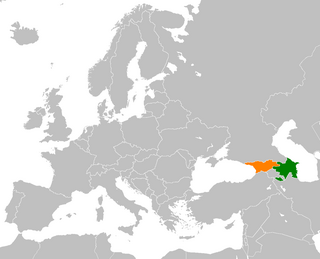
Foreign relations exist between Azerbaijan and Georgia, two neighboring small nations which were former Republics of the Soviet Union. Azerbaijan has an embassy in Tbilisi and Georgia has an embassy in Baku. Both countries are full members of the Council of Europe, the Organization for Security and Co-operation in Europe (OSCE) and the Organization of the Black Sea Economic Cooperation (BSEC). The two countries are among the four founding members of the GUAM Organization for Democracy and Economic Development along with Ukraine and Moldova.

Bilateral ties exist between Azerbaijan and Italy. Azerbaijan has an embassy in Rome, while Italy has an embassy in Baku. Both countries are full members of the Council of Europe and the Organization for Security and Co-operation in Europe (OSCE).

Interstate Oil and Gas Transportation to Europe (INOGATE) was an international energy co-operation programme between the European Union (EU), the littoral states of the Black and Caspian seas and their neighbouring countries. The programme was operational from 1996 to 2016.
Two-thirds of energy in Azerbaijan comes from fossil gas and almost a third from oil. Azerbaijan is a major producer of oil and gas, much of which is exported. Most electricity is generated by gas-fired power plants. Energy is all types of energy products, including fuel, renewable energy, water energy, electrical and heat energy.

Economy in Kurdistan Region consists of the autonomous economy in Kurdistan region in northern Iraq. The Kurdistan region's economy is dominated by the oil industry, agriculture, manufacturing and tourism.

Iraq was the world's 5th largest oil producer in 2009, and has the world's fifth largest proven petroleum reserves. Just a fraction of Iraq's known fields are in development, and Iraq may be one of the few places left where vast reserves, proven and unknown, have barely been exploited. Iraq's energy sector is heavily based upon oil, with approximately 94 percent of its energy needs met with petroleum. In addition, crude oil export revenues accounted for over two-thirds of GDP in 2009. Iraq's oil sector has suffered over the past several decades from sanctions and wars, and its oil infrastructure is in need of modernization and investment. As of June 30, 2010, the United States had allocated US$2.05 billion to the Iraqi oil and gas sector to begin this modernization, but ended its direct involvement as of the first quarter of 2008. According to reports by various U.S. government agencies, multilateral institutions and other international organizations, long-term Iraq reconstruction costs could reach $100 billion (US) or higher.